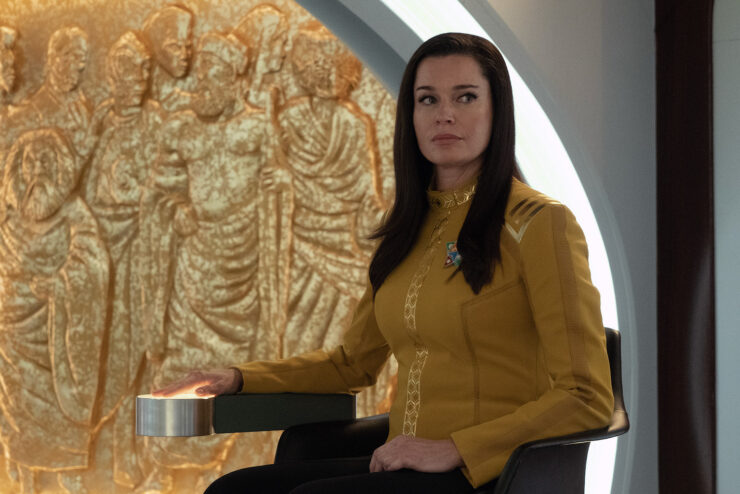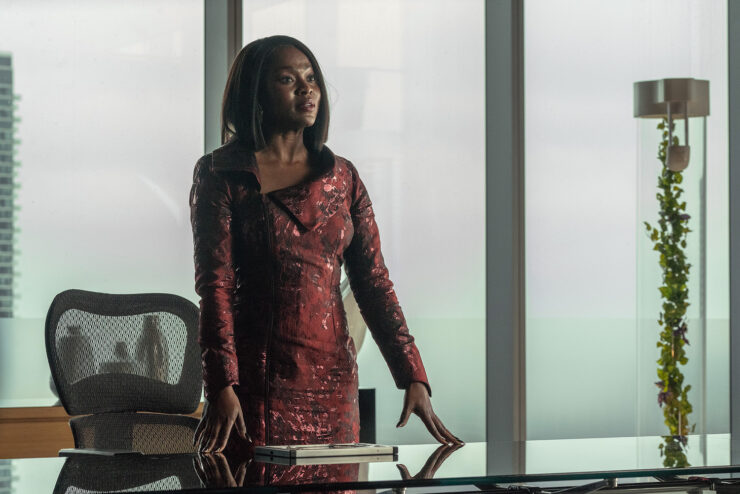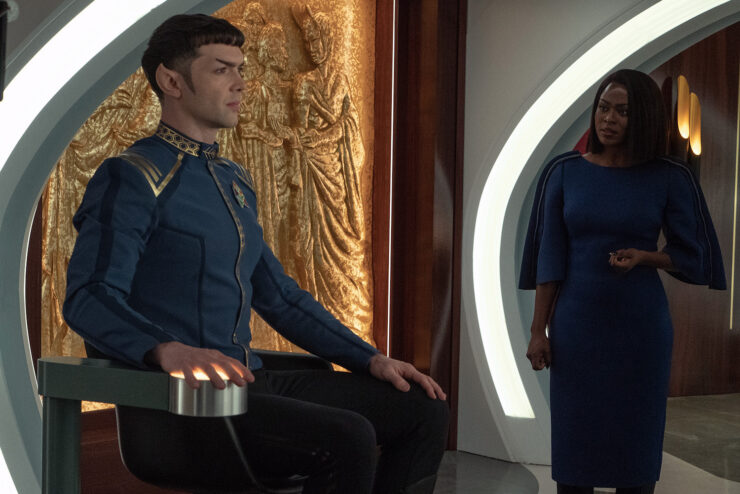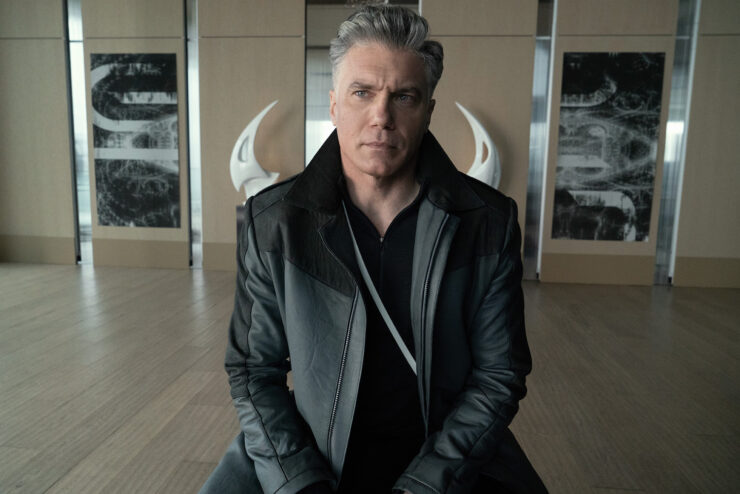I’m opening my review of the second episode of SNW season two with a comment about Deep Space Nine. First, let me say that DS9 is my favorite of all the Trek shows (though this show has been challenging it). But it did introduce two horrid concepts to Trek that left permanent scars on the franchise: the genetic engineering ban and Section 31.
One of the many great things about “Ad Astra per Aspera” is that it puts a great deal of salve on the first of those scars. (Let’s just hope the forthcoming Michelle Yeoh movie does the same for the latter…)
When Dr. Julian Bashir was revealed to be genetically enhanced in DS9’s “Doctor Bashir, I Presume?” it was further established that elective genetic modification was illegal in the Federation, explained as trying to avoid another Khan Noonien Singh, to prevent the Eugenics Wars from happening again.
At the time, it probably seemed sensible, especially since twenty-fourth-century humans were being played by humans on the cusp on the twenty-first century, and this provided cover for why we didn’t see the kind of human body modification (for both medical and elective reasons) that will surely happen as technology improves over the next four hundred years.
But it flies in the face, not only of common sense (seriously, how many major, life-changing laws are on the books now that are based on stuff that happened in the 1600s?), but of the very notion of the Federation. The idea that the Federation would discriminate against, well, anyone is antithetical to what Trek is supposed to be about.
Making the decision to make use of the backstory established by the late great D.C. Fontana for Number One in the 1989 novel Vulcan’s Glory as a genetically enhanced Illyrian meant that SNW intended to address this issue head-on. There wasn’t a need to—there was no need to use Fontana’s background as a blueprint for Una Chin-Riley, as evidenced by that very choice of nomenclature, which did not come from Vulcan’s Glory.
I’m really glad they did it, though, because it resulted in one of Trek’s best episodes.

Most every Trek show has done at least one trial-type episode, whether it’s a full trial, a preliminary hearing, or some other kind of adversarial judicial process that takes up a major chunk of the episode. The original series had “Court Martial” and “The Menagerie,” TNG had “The Measure of a Man” and “The Drumhead,” DS9 had “Dax” and “Rules of Engagement,” Voyager had “Death Wish” and “Author, Author,” Enterprise had “Judgment,” Discovery had “Unification III,” Lower Decks had “Veritas.” (Picard never did one, and Prodigy hasn’t yet.)
Many—though not all—of the above are strong episodes, and indeed many would list “The Measure of a Man” as one of TNG’s best, if not one of Trek’s best. But right now, I gotta say that “Ad Astra per Aspera” blows them all out of the water.
It’s to the credit of the SNW production staff in general and to writer Dana Horgan in particular that nobody felt the need to graft a B-plot onto this. There’s more than enough story here for an hour, and even though it’s entirely people in a room talking to each other, it’s all incredibly compelling.
It also gives Rebecca Romijn a long-overdue spotlight. We get Number One’s full background, growing up on an Illyrian colony that was given provisional Federation membership as long as they stopped their genetic engineering. However, they didn’t. We see the hardships this forces upon them, as we open with a flashback to Chin-Riley’s youth, having broken her leg, and her parents unwilling to take her to a doctor lest they see her glowy healing ability (first seen in “Ghosts of Illyria”). Later, while testifying at her court martial, she explains that they had to seek out sympathetic doctors to treat them—a state of affairs that will ring with depressing familiarity to women seeking gynecological care before 1972 (and more recently in some states), and to LGBTQ+ folks seeking any kind of medical care during the worst of the AIDS epidemic in the 1980s and 1990s.
Romijn beautifully sells Number One’s anguish, because it’s subtle. She’s hidden who she really is for so long that, when the pain does come out, it’s quiet. It’s a seeping wound, not a gushing one. This nicely retcons the portrayal of the character in “The Cage,” to wit, Pike saying she doesn’t count as a woman on the bridge because she’s subsumed her femininity so much to be almost robot-like, so she can succeed in a man’s world. (Yay, 1964.) Now we have a reason for it that doesn’t come out of a sexist patriarchal norm: she’s spent twenty-five years hiding who and what she is.
More to the point, she’s hidden what she went through: the discrimination, the taunts from the non-Illyrian kids, being forced to hide, and then later to assimilate and pretend to be something she isn’t.
And then she found Starfleet, and this was my favorite moment in the episode. Chin-Riley describes the first time she saw a Starfleet crew, which visited her homeworld when she was five or six: “They were all so different from one another. So many crewmembers from so many planets—it was beautiful.” With those two sentences, Number One magnificently expressed what viewers in 1966 saw when the original series aired: in a time of unrest, of wars both hot and cold, viewers got to see a united Earth, of people of different cultures and skin tones and beliefs all working together without comment, without it even being considered unusual. Romijn delivers her colloquy on what Starfleet means to her with a subdued intensity that is incredibly compelling.

As good as Romijn is, though, hers is the second-best performance in this episode, as truly the hour is utterly owned by Yetide Badaki as Neera Ketoul, the Illyrian civil-rights lawyer Pike went chasing after last week. Badaki—who was stellar as Bilquis in American Gods—completely takes over the episode. Which, frankly, is as it should be in a trial story. After all, the focus in this type of tale is on the ones making the case, as it were. Sometimes that’s a regular—Picard in “The Measure of a Man,” Burnham in “Unification III”—sometimes it’s a guest—Elisha Cook Jr.’s Sam Cogley in “Court Martial,” J.G. Hertzler and John Vickery’s Klingon lawyers in “Judgment”—but they’re central to the story.
Horgan’s script also gives Badaki some great material. It starts with Ketoul pointing out that, yes, genetic engineering is illegal. But once upon a time, slavery was legal, discrimination was legal, sexism was legal. (At this juncture, I feel the urge to point out that neither marital rape nor domestic violence were actually considered crimes in all fifty states until the mid-1990s.) Being legal doesn’t make something morally right.
Ketoul puts April on the stand. April sponsored Chin-Riley to Starfleet Academy, and she served under him on Enterprise. He speaks warmly of her, but when asked directly if he’d have still sponsored her knowing she was Illyrian, he says no, because it would violate regulations. Ketoul then pulls out three separate occasions when April, as Enterprise captain, violated the Prime Directive, in each case in order to save lives, because if nearly six decades of Star Trek have taught us nothing else, it’s that Starfleet captains will bend the rules to save lives. April awkwardly points out that captains have to make judgment calls. The tribunal, pointing out that April isn’t the one on trial, excuses him from the stand and strikes his testimony from the record.
This leads to an unpleasant conversation in Pike’s quarters, as April angrily tells Pike that Ketoul as defense attorney was his idea (well, his and Number One’s, but whatever), and April never got a chance to testify on the record about what a great officer Chin-Riley is.
Buy the Book


System Collapse
There are some nice bits where Spock, M’Benga, and La’an are called as character witnesses. Spock speaks to her leadership abilities, and how much he has learned from her. (He also mentions her penchant for Gilbert & Sullivan, a lovely callback to the Short Trek “Q & A.”) M’Benga speaks to her compassion and how she looks out for her people. La’an tells everyone about how Chin-Riley is directly responsible for saving La’an’s life and indirectly responsible for all the lives La’an herself has saved as a member of Starfleet security.
Pike is not one of those who takes the stand. As Captain Batel points out, if he’s on the stand, he has to testify that he knew his first officer was Illyrian for months and didn’t report it. (Batel is the prosecuting attorney, which makes nothing like sense, as she’s not an officer of the Judge Advocate General, she’s a starship captain. But I guess they wanted the familiar face of Melanie Scrofano and her relationship with Pike rather than a stranger, though it does feel like a callback to the Kirk-Areel Shaw relationship in “Court Martial”…)
Unfortunately, it comes out anyhow, as Batel’s boss in the JAG office, Vice Admiral Pasalk (played with spectacular snottiness by Graeme Somerville), takes over the questioning of Chin-Riley to get that information on the record.
However, Ketoul has two more cards to play. Her questioning of Chin-Riley includes, not just the awful details of her childhood, growing up being discriminated against for being Illyrian, but also how Starfleet provided her with a safe haven, a place where she wouldn’t be tormented, a place where she could thrive.
And then we get the bombshell—which I actually saw coming—which is that Chin-Riley herself is the one who revealed her heritage. She turned herself in. This tracks with what we’ve seen before, from her offering to resign in “Ghost of Illyria,” and her calm acceptance of arrest in “A Quality of Mercy.” She doesn’t want to hide anymore, and she doesn’t want to get anyone else in trouble for her choice.
Then Ketoul brings it all together by having Batel read the requirements for Starfleet to grant asylum: the person is fleeing persecution, seeks safety within Starfleet, and asks for asylum. Starfleet captains must use their judgment in granting asylum, and the request must be ultimately confirmed by a tribunal or designated authority.

Number One’s testimony made it clear that she fulfilled the three requirements, having asked for asylum by identifying herself to Pike in “Ghosts of Illyria,” with Pike using his discretion, just the same way April did in the examples she cited during the admiral’s testimony. All that’s left is for the tribunal to grant her that asylum.
It’s a legal split hair, a technicality, but I find myself reminded of a line from Star Trek Into Darkness spoken by Zachary Quinto’s iteration of Spock: “I am Vulcan, sir, we embrace technicality.”
And in the end, Chin-Riley is back to being Pike’s Number One, Ketoul is pleased that there’s at least one Starfleet crew who’s proud to be serving under an Illyrian, and everyone lives happily ever after. We don’t get the wholesale rescinding of the genetic engineering laws that we should have, because we know those laws are still on the books a century hence. Instead, we get nonsense justifications of the rationale behind the laws from the tribunal, and even from Ketoul herself. But it’s a step in the right direction, at least, and a legal precedent that could be used by, say, Discovery or some future Trek show to finally dump the law all together.
There are some other great moments in this episode. At one point, Spock and Pasalk are talking, and M’Benga and Ortegas are observing from across the room. Ortegas assumes from their outwardly calm demeanors that they’re “Vulcan bros,” but M’Benga assures her that the two of them can’t stand each other. When M’Benga was introduced in the original series’ “A Private Little War,” it was as someone who did his medical internship at a Vulcan hospital. He therefore is much better at reading Vulcan body language. Spock soon proves M’Benga right by apologizing for his “outburst,” and admitting that he finds Pasalk—a former colleague of his father’s—to be particularly annoying. Ortegas’ combination of shocked and amused is delightful.
And, to remind us who the star of the show is, Pike gets several very strong one-on-one conversations. It starts with his persistence in getting in to see Ketoul and convincing her to take Chin-Riley’s case. It continues with two different talks with Batel, one about Chin-Riley rejecting the plea deal Batel worked her ass off to get approved, and later with Batel explaining to Pike why he can’t take the stand. And then there’s the conversation with April, where the pissed-off admiral refuses the drink Pike offers and walks out on him. (Pike blithely pours April’s drink into his own and gulps it all down. It’s that kind of day…)
In a nice touch, we get some callbacks to the original series, including the same bell used by the tribunal, the dress uniforms that look similar to those from 57 years ago, and the glowy thing you put your hand on that will say if you’re lying or not.
Last time, I expressed annoyance that we had to wait yet another week for Number One’s trial, but having seen it, I approve of the decision. For all that it’s one of SNW’s best—indeed, I think it will go down as one of Trek’s best—it would’ve made for a bit too staid of a season premiere.
Finally, nice to see that SNW is continuing the Trek tradition of whipping out the Latin for episode titles. In this case, it’s also a nod to Enterprise, as “ad astra per aspera” was Earth Starfleet’s motto on that show, and Chin-Riley mentions learning that in history class. And next week, it’s that other Trek title standby, a Shakespeare quote, as it’s called “Tomorrow and Tomorrow and Tomorrow.” See y’all then…
Keith R.A. DeCandido will have a short story in the historic anthology Weird Tales: 100 Years of Weird, edited by Jonathan Maberry, celebrating a century of Weird Tales magazine, now available for preorder and being released in October from Blackstone Publishing. Keith’s story is called “Prezzo,” taking place on the Lower East Side of Manhattan in the 1930s, and about Italian immigrants, racial prejudice, and scary monsters. More info here.










